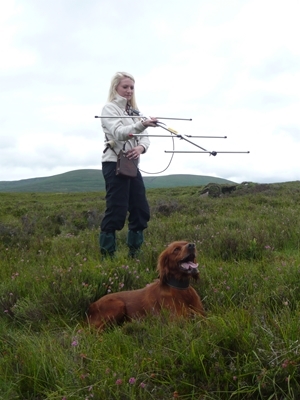 Red grouse, the king of gamebirds, are laying their eggs earlier in the season in response to warmer springs.
Red grouse, the king of gamebirds, are laying their eggs earlier in the season in response to warmer springs.
A 20-year long research project by the Game & Wildlife Conservation Trust has just been published in the scientific journal Ibis. The research has monitored the laying dates of red grouse using radio-tagged hens in Strathspey, in the central Scottish Highlands.
It shows grouse laying dates have advanced by 0.5 days per year. The gradual increase in spring temperatures and specifically warmer April temperatures has resulted in earlier laying by the grouse. Although warmer springs provide more plant food for the hens to get into good condition for breeding, warming in May and August may be less good for important food sources for the chicks. Although grouse were the only species monitored in this particular study, the climatic effects will also be relevant to other bird species.
Dr Kathy Fletcher, head of GWCT's Scottish upland research said:
“Although warmer Aprils appear to benefit grouse, warmer Mays and Augusts were not particularly good news for the grouse. A warm May was likely to drive an earlier emergence of craneflies or daddy-longlegs a key chick food. An early fly hatch means the grouse chicks hatch too late to take advantage of the abundant food source. Warmer Augusts result in fewer craneflies surviving to produce eggs for the following year. However, birds that laid earlier tended to have larger clutches and better chick survival.”
“So far grouse numbers have not been affected by the temperature range reported in this study. But it is important that we continue this kind of research and also expand it to other parts of the birds’ range.”
Radio-tracking hen grouse to determine the laying dates also allows the GWCT researchers to find grouse chicks. Monitoring the grouse chicks at about 10-days old allow the team to find out how many ticks they are carrying. Ticks themselves and the diseases they carry can have a negative effect on chick survival and may also be increased by warmer, damper spring weather.
“We monitor environmental tick levels by literally dragging a blanket across the heather but the best way is to catch the chicks themselves. This can only be done during a small window before the chicks are large enough to fly away when disturbed. We are currently monitoring grouse chicks on a range of sites which have different levels of the mammalian tick hosts (sheep, red deer, mountain hare) to try and understand what density of each species are best to keep the tick levels low.”
The research work undertaken by the Trust is used by grouse moor managers to form future management plans, particularly to ensure a good stock of grouse into the shooting season which begins on August 12th. Supporting the management of moors for grouse shooting is important as research shows that it is beneficial for a suite of other wildlife including wading birds which are declining elsewhere.
END
Caption: GWCT research student Robyn Owen with Keira the setter, track the radio-tagged hen red grouse by radio telemetry and ground scent.
Notes to editors
The Game & Wildlife Conservation Trust is an independent wildlife conservation charity which carries out scientific research into Britain’s game and wildlife. We advise farmers and landowners on improving wildlife habitats. We employ 22 post-doctoral scientists and 50 other research staff with expertise in areas such as birds, insects, mammals, farming, fish and statistics. We undertake our own research as well as projects funded by contract and grant-aid from Government and private bodies. The Trust is also responsible for a number of Government Biodiversity Action Plan species and is lead partner for grey partridge and joint lead partner for brown hare and black grouse.
For information, contact:
Playfair Walker
Telephone: 0131 445 5570
Email: richard@playfairwalker.com